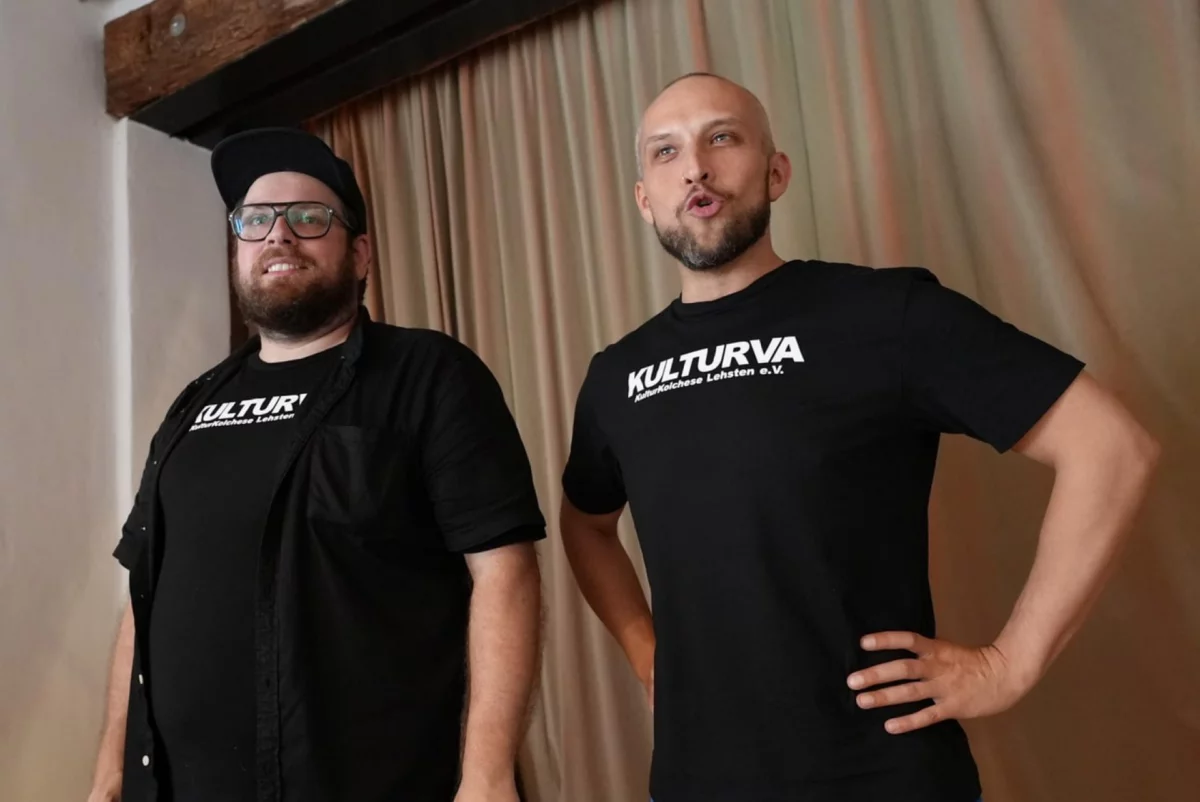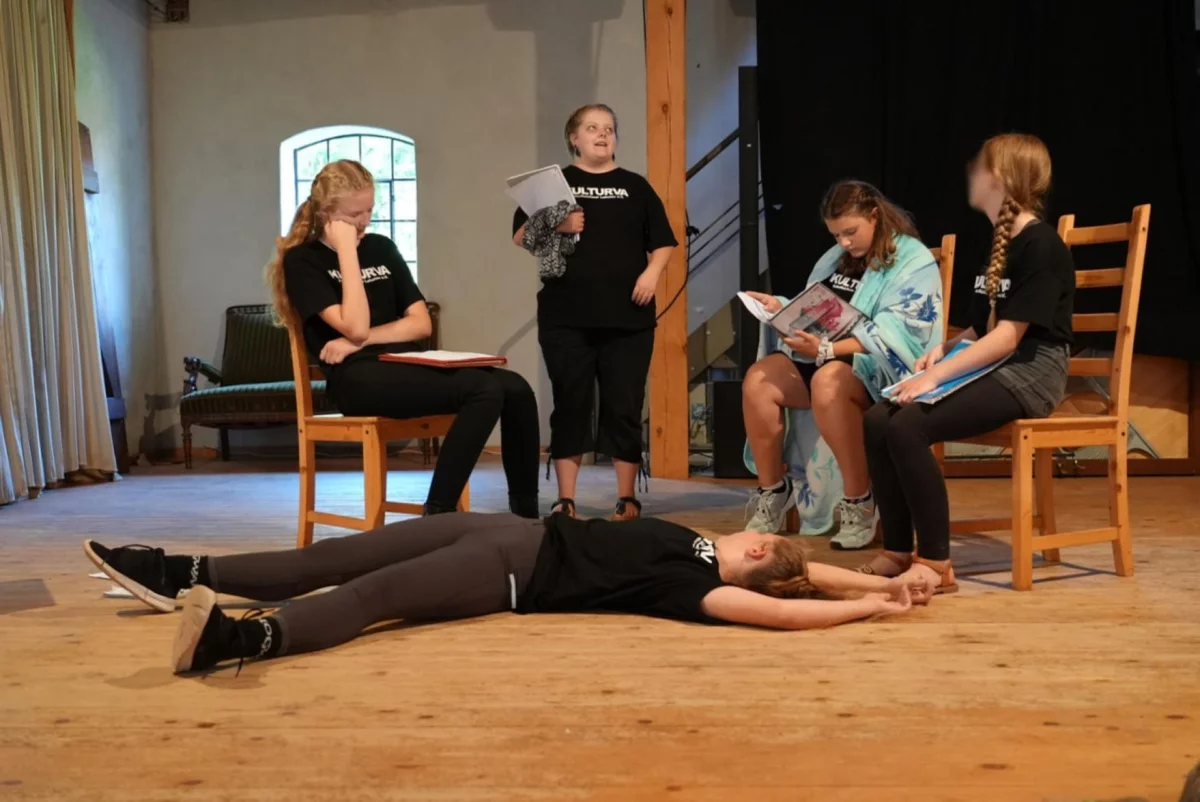The Kulturkolchose theater workshop
By Steffi Kühn
There was plenty of demand from young people for local cultural activities. The Kulturkolchose Lehsten association, together with the Möllenhagen parish and the Wendorf children's castle, quickly initiated two theater workshops – supported by the Fonds Darstellende Künste as part of the GLOBAL VILLAGE KIDS program. Initiator Steffi Kühn reports on the two projects.
The small association Kulturkolchose Lehsten e.V. operates in the state of Mecklenburg-Western Pomerania, in one of the most rural areas of Germany. Some of the association members are actors and one is a theater director. So, the world of theater has always felt quite at home in the small village of Lehsten. A number of different things have been tried out and put into practice, such as converting an old minivan into a radio play cinema, performing on a natural stage and much more. There were always curious children watching the lively goings-on. It was obvious that we were doing something for the kids here who have no opportunity to participate in or even attend cultural events. The school in Möllenhagen opened its doors to us, and the Möllenhagen parish youth club was quickly on board. The management of the children's home invited us right into the home to hold the workshop.
Kulturva – culture and art is a home for everyone
There is excitement in the courtyard of the Büdnerei Lehsten. The theater workshop is having a lunch break. The laughing children are hungry. A lot of energy was burned off in the morning and a lot more will be generated in the hours to come.
Children and young people can spend a week exploring and immersing themselves in the world of theater. In the "Kulturva" workshop, led by the two actors Sandro Šutalo and Christian Bojidar Müller, classic theater forms, texts and perspectives are broken down and made accessible to young people. Sandro and Christian quickly realize that the children are hugely enthusiastic and that many of the methods they had previously developed work, although some don’t. It’s good that there are two of them and that they can adapt and rearrange the methods until late into the night. With the help of improvisation, choreography, music and "classic" theater texts, a small performance is created. At the performance, the children’s eyes light up and their parents look on with pride. Afterwards, there’s lots to talk about over pizza and the children are pretty self-confident and wish for only one thing: more of this kind of thing here in the countryside, where people usually only meet at the bus stop.
 © Heike Sählbrandt, Wanda Möller
© Heike Sählbrandt, Wanda Möller
Actors on their experiences
“There were many moments that struck me during the workshop. How social the young people were with each other, how helpful, how they really tried to accept and support each other. How much the group faced their insecurities and fears and climbed the high mountain of classical language.” Sandro Šutalo
“It’s always really great to see how young people find their own approaches to art and culture. Classical texts are difficult for young people to access without a playful approach and are often left to waste away as dry and boring under their school desks. By awakening the playful imagination in pupils as early as possible, we not only facilitate access to this material, but also teach them how much fun you can have as a group with the old hams.” Christian Bojidar Müller
Giving expression to anger – an experiment
Setting, location, participants – everything is different in the second workshop. In a children’s home, girls, most of whom have experienced trauma, embark on a journey. The topic of “female rage” is to be the focal point of the theater exercises. What girl or woman hasn't heard the phrase “Don't be so hysterical” when she’s angry? Female anger is linked to shame and insecurity and still harks back to stereotypes that we are only slowly leaving behind. So, we thought we had to give the girls the opportunity to discover their anger in a protected space, to encourage them to give their own anger a rightful place. But these girls are already angry, which is no wonder given their backgrounds. This means first of all having lots of conversations, individually and in the group, exploring sensitively, building trust. The workshop leader and actress Lisa Marie Stojčev listens to many a girl’s story late into the night. Using a broad repertoire of methods and flexibility in dealing with the group, there is finally success. The girls open up and there is even a short performance at the end. More important, however, is the empowerment and recognition of the girls. When saying goodbye, the girls ask Lisa to come back and do it again.
 © Heike Sählbrandt, Wanda Möller
© Heike Sählbrandt, Wanda Möller
Actress on her experiences
“Each girl has overcome fears and inhibitions in her own way, has jumped into acting and, in the process, has experienced courage and self-confidence. As a group living together, they also got to know each other in a new way and experienced connection and support with each other and through each other. Watching this was very rewarding and powerful.” Lisa Marie Stojčev
With GLOBAL VILLAGE KIDS, the Fonds Darstellende Künste supports projects at the interface of performing arts and cultural education in rural and digital spaces, financed by the Federal Ministry of Education and Research as part of “Kultur macht stark. Bündnisse für Bildung.”
The Kolchose theater workshop project was carried out during the summer and autumn vacations 2023 in Möllenhagen/ Mecklenburg-Western Pomerania with children and young people between the ages of 11 and 18.